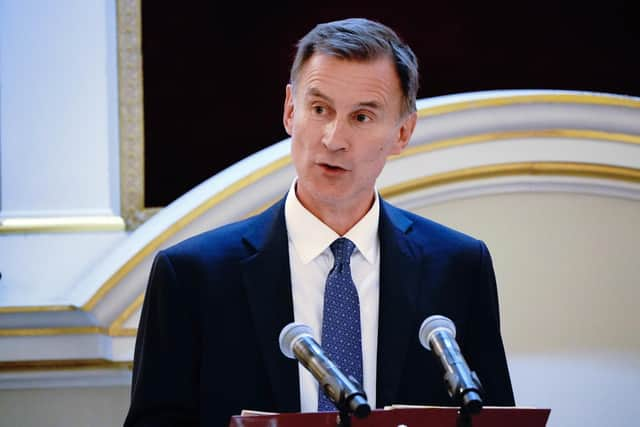Scrapping inheritance tax would lead to 'unacceptable trade-offs' Chancellor warned
The Government is reportedly considering increasing the threshold at which estates pay inheritance tax as a precursor to abolishing the duty entirely following mounting pressure from senior Tories such as Liz Truss and Nadhim Zahawi.
Some Conservatives have claimed increasing the threshold or abolishing the tax could win the party the next election, but a report by think tank Demos published on Tuesday suggests even people who oppose inheritance tax are worried about the consequences of scrapping it.
Advertisement
Hide AdAdvertisement
Hide AdIt comes ahead of Jeremy Hunt’s autumn statement which is scheduled to take place in late November, with many on the Conservative benches pushing for tax cuts.


The Demos study, which polled 2,000 people and carried out focus groups with more than 100 voters, found widespread agreement that abolishing inheritance tax “could cause unacceptable trade-offs”.
Participants repeatedly described the tax as a “necessary evil” that raised money for the Treasury, and feared getting rid of it would mean either other taxes would have to increase or spending on public services would have to be cut.
Dan Goss, one of the report’s authors, said: “We found that the public are worried that cutting inheritance tax, in today’s economic climate, would harm public finances and potentially mean cuts to public spending. This concern is felt even amongst those that are most against the idea of taxing inheritances.
Advertisement
Hide AdAdvertisement
Hide Ad“Policy makers must not take the public’s views for granted. They need to listen to the public in more depth to really understand the options available to them. This research challenges the idea that cutting IHT is an automatic vote winner – if politicians make the right case for it, the public will understand.”
The Office of Budget Responsibility forecasts that inheritance tax will raise £7.2 billion for the Treasury this year, more than the expected cost of extending free childcare over the next two years.
Mubin Haq, CEO of the Financial Fairness Trust, which supported Demos’s research, said: “The public are increasingly savvy that tax cuts come at a price. Whilst inheritance tax is far from popular, even many of its staunchest opponents are worried it could lead to either tax rises elsewhere or cuts to valuable public services, which have already faced years of severe under-funding.”
On Monday, the Prime Minister was silent on speculation that he was considering changes to inheritance tax, saying only that “the most important tax cut I can deliver for the British people is to halve inflation”.
Advertisement
Hide AdAdvertisement
Hide AdBut cabinet minister Grant Shapps described the duty as “punitive” and “deeply unfair”.
Inheritance tax is levied at 40 per cent, but the vast majority of estates fall below the threshold – which can be up to £1 million for a couple – to incur the charge.
It comes as Mr Hunt was urged by the Confederation of British Industry (CBI) to boost business investment to drive growth.
Rain Newton Smith, CBI Director General, said: “The Spring Budget provided strong foundations for stability and growth and set the right tone in challenging economic circumstances. While progress has been made, weak GDP and productivity growth is still selling the UK short.
Advertisement
Hide AdAdvertisement
Hide Ad“Meeting our sustainable growth ambitions means not only ramping up FDI but getting businesses at home investing again at scale. We also can’t afford to be seen to retreat from high value green markets.
“We’re confident that the three-point plan we have laid out ahead of the Autumn Statement can get the UK back on the front foot in the quest for long-term sustainable growth, as well as providing the low-cost, high impact tools needed to deliver lasting prosperity and resilience.”